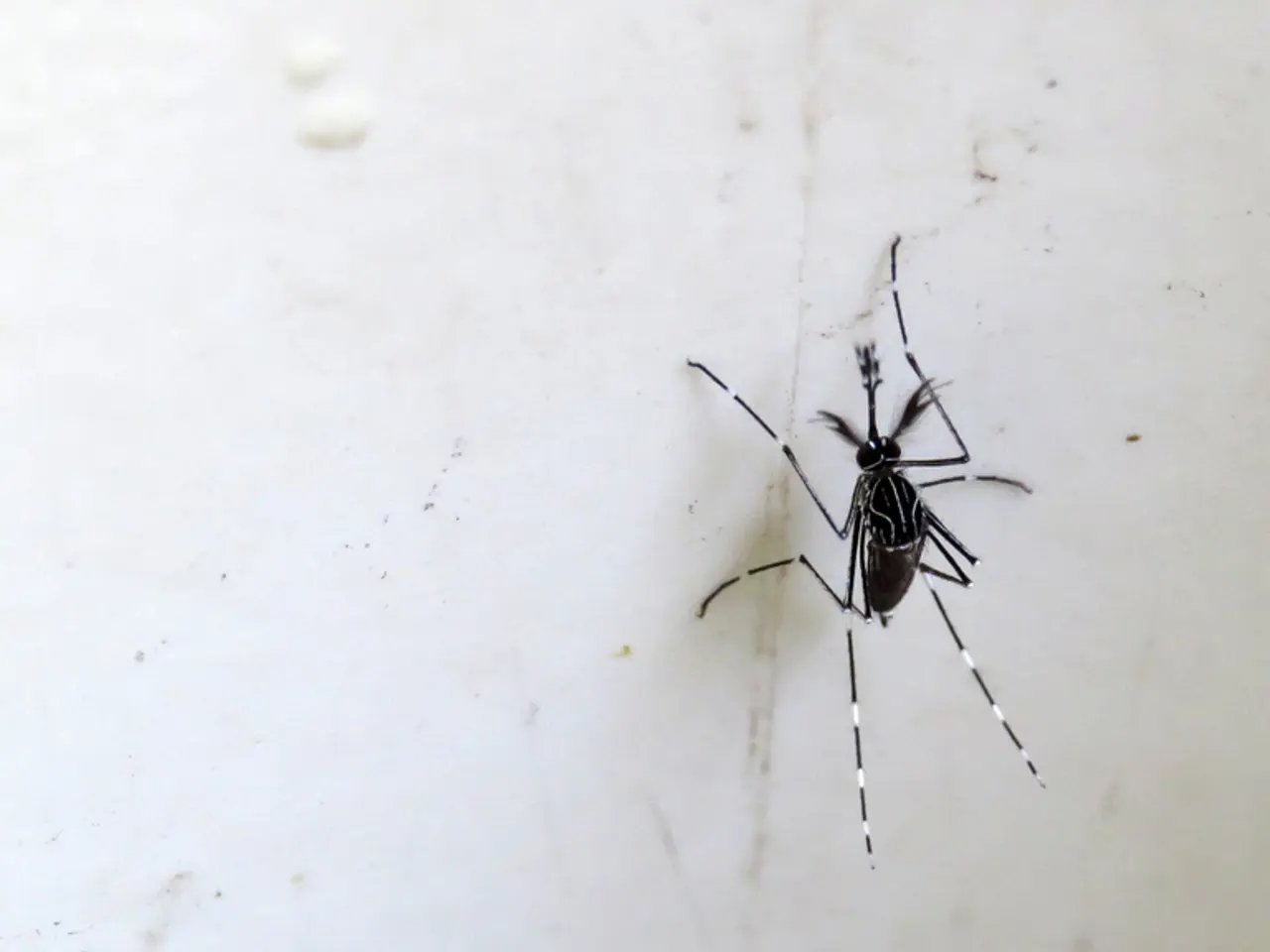Tropical Virus: Increase in Stinging Insects Prevalence noted in Karlsruhe
In the picturesque Rhine Valley and the Karlsruhe district, a growing concern is brewing as biting insects find ideal conditions for growth. The Asian tiger mosquito, a species known to transmit diseases like dengue, chikungunya, and Zika virus, is increasingly present in cities such as Karlsruhe, Mannheim, and Freiburg.
Historically rare or absent in the region, tropical viruses are now posing a new health hazard in the southwest. While no locally transmitted Chikungunya cases from Baden-Württemberg are known yet, the risk is growing. In fact, a Chikungunya virus infection has been detected in a person six kilometers from Offenburg.
Scientists and public health officials are actively monitoring mosquito populations and disease incidence to assess the current risk level. Regular monitoring of mosquito populations is carried out through traps and citizen reporting to track the spread and density of Asian tiger mosquitoes.
To combat the breeding sites of these biting insects, citizens can now actively participate by using Bti tablets. This biological control method targets the mosquito larvae, helping to reduce their numbers.
Preventive measures also include public awareness campaigns to educate the population about reducing mosquito breeding sites, personal protective measures such as the use of mosquito repellents, window screens, and protective clothing, and community engagement through local authorities, health departments, and residents collaborating on elimination of breeding sites and reporting of mosquito nuisances or disease symptoms.
The spread of the Asian tiger mosquito is favored by warm summer months and rising temperatures, making it a growing concern in the Karlsruhe district. Meteorologists are also concerned about severe extreme weather in Karlsruhe, which could further exacerbate the situation.
To stay informed about the most accurate and up-to-date local data, consulting Karlsruhe district’s public health office or Baden-Württemberg state health authorities is recommended. Tropical experts advise individuals to protect themselves from mosquitoes for two weeks after returning from tropical countries.
While the further spread of biting insects into the country is still rare, it is not impossible, according to the Robert Koch Institute. The public is encouraged to remain vigilant and take necessary precautions to protect themselves from these potentially harmful insects.
- The rise of the Asian tiger mosquito in the Rhine Valley and Karlsruhe district is a growing worry for health and wellness experts.
- The threat of diseases like dengue, chikungunya, and Zika virus, transmitted by these mosquitoes, is a dire concern in cities such as Karlsruhe, Mannheim, and Freiburg.
- Scientists and health officials are closely monitoring mosquito populations and disease incidence to assess the situation's severity.
- Regular surveillance of mosquito populations is conducted through traps and citizen reporting to track the mosquitoes' spread and density.
- To combat the mosquitoes' breeding sites, citizens can use Bti tablets, a biological control method targeting mosquito larvae.
- Preventive measures include public awareness campaigns to educate the population about reducing mosquito breeding sites.
- Personal protective measures such as mosquito repellents, window screens, and protective clothing are also recommended.
- Community engagement through local authorities, health departments, and residents collaborating on eliminating breeding sites and reporting of mosquito nuisances or disease symptoms is crucial.
- The spread of the Asian tiger mosquito is favored by warm summer months and rising temperatures, making it a significant concern in the Karlsruhe district.
- Meteorologists are also concerned about severe extreme weather in Karlsruhe, which could further exacerbate the situation.
- To stay informed about the most accurate and up-to-date local data, consulting Karlsruhe district's public health office or Baden-Württemberg state health authorities is advisable.
- Tropical experts advise individuals to protect themselves from mosquitoes for two weeks after returning from tropical countries.
- While the further spread of biting insects into the country is still uncommon, it is not impossible, according to the Robert Koch Institute.
- The public is encouraged to remain vigilant and take necessary precautions to protect themselves from these potentially harmful insects.
- Workplace wellness programs should consider educating employees about mosquito-borne diseases and preventive measures.
- Chronic diseases and medical conditions can weaken the immune system, increasing the risk of complications from mosquito-borne illnesses.
- Employees with such conditions should be reminded to take extra care during warmer months when mosquito activity is higher.
- Proper nutrition plays a crucial role in maintaining overall health and boosting the immune system.
- A well-balanced diet rich in fruits, vegetables, lean proteins, and whole grains can help strengthen the body's defense against diseases.
- In the context of environmental science, climate change can affect health and wellness by influencing the geographical distribution of mosquitoes and diseases they transmit.
- Fitness and exercise improve cardiovascular health, boost mood, and strengthen the immune system, all of which can help protect against mosquito-borne illnesses.
- Cybersecurity concerns can extend to health and lifestyle, with personal data breaches posing a threat to privacy and potentially compromising healthcare services.
- Lifestyle choices such as smoking, excessive drinking, and poor sleep habits can negatively impact general health and weaken the body's ability to fight off diseases.
- Skin care is an essential aspect of overall wellness, with proper care helping to maintain a healthy complexion and protect against skin conditions exacerbated by mosquito bites.
- Various therapies and treatments are available for managing chronic diseases, offering relief and improving the quality of life for those affected.
- Mental health is an integral component of overall well-being, with good mental health contributing to a stronger immune system and greater resilience to stress.
- Stress management techniques such as meditation, yoga, and mindfulness can help promote mental health and reduce the risk of developing mental health conditions.
- Finance plays a crucial role in accessing healthcare services, with proper wealth management ensuring financial security during illness or injury.
- In the face of mosquito-borne diseases, the importance of taking proactive steps against environmental threats, maintaining personal health, and practicing sound financial management is clear.




